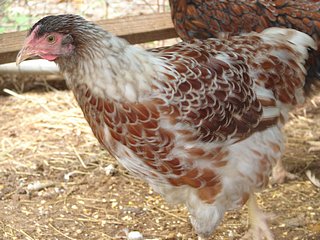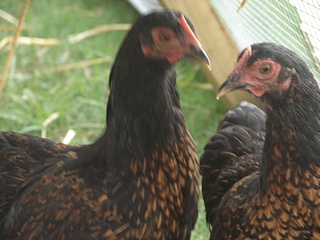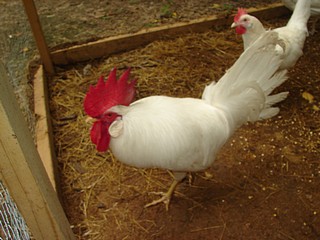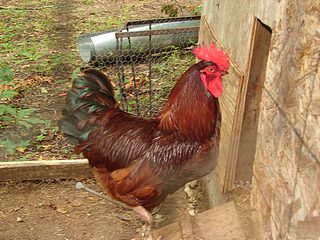What Are The Best Backyard Chicken Breeds?
The popularity of backyard chicken breeds and breeding is ever-growing. Perhaps it is the economy. Perhaps it is the fact that people are beginning to not trust where their food is coming from.
Perhaps it is the fact that people are desiring the homesteading lifestyle more, wanting to grow closer to self sufficiency.
So if you are a first timer when it comes to raising any backyard chicken breed, you may want a simple guide to the best breeds that are suited for small backyard flocks. I assume that you are looking for hens that are good egg laying chickens of a medium to large egg, and that you would like a chicken that is hardy and not prone to disease and health problems, and that you want a bird that is relatively easy to handle and can even be held and appreciated by youngsters.

Another additional factor that we will consider here is the
breed rarity. For a backyard chicken owner, you would not go after the rare expensive breeds, unless that is simply what you wanted to raise. Considering this, we are not going to include rare birds for the list below.
There are many breeds that will fit this bill. What I am attempting to do for you here is to break this down to the ones that I would recommend and the reasons why.
I know, many of you "experts" on these matters may very well disagree with me. That's fine and I'm not necessarily claiming "expert" status on these matters either. I'm speaking from my experience and from the research that I have done.

First let's take a look at egg laying chickens. These hens lay frequently and without much effort, will produce quality eggs. I will rank them for backyard chicken breed egg laying qualities and assign them a number with 1 being the worst and 10 being the best.
In alphabetical order:
Brahmas: These guys are consistent layers of a brown medium sized egg. (7)
Cochins: Are consistent layers of a tinted or yellowy brown small sized egg. Points deducted here for egg size. (5)
Leghorns: Maybe the greatest egg-layers. They lay a pearl white egg that is very large. (10)
Orpingtons: Lays a brown medium to large sized egg. They are good winter layers. (8)
Plymouth Rocks: They lay a light pinkish to medium brown egg that is large in size. (8)
Rhode-Island Reds: Lays a rich to medium brown egg that is large in size. Good winter layers. (9)
Wyandottes: Lays a light to rich brown large sized egg. Also good winter layers. (9)

Now, let's consider these same breeds for their hardiness. Let me first say that no breed of bird is disease resistant.
Much like humans, any chicken is one bad bacteria away from being sick, but also like humans, some birds are just better built than others and have the right heritage and genes to with stand certain weather and problems. Here are how these birds rank and why.
In alphabetical order:
Brahmas: These guys are robust and hardy in both heat and cold. No particular problems. (9)
Cochins: Very cold hardy. Their feathered feet could need attention if you free range. (8)
Leghorns: These guys are heat tolerant. In extremely cold places their combs can be subject to frostbite. Tough birds. (8)
Orpingtons: They are a hardy breed and do well in cold weather. (9)
Plymouth Rocks: Robust and very cold hardy. (9)
Rhode-Island Reds: They are robust and hardy in heat and cold. Combs subject to frostbite in extreme cold. (8)
Wyandottes: Robust and very cold hardy. No major breed issues. (9)
What birds are the most docile? When looking for a backyard chicken breed this could play a major factor.
If you don't live out in the country your birds will obviously encounter more people. This means that you will want birds that will not attack and that enjoy being around people.
You also don't want extremely noisy birds that will continuously annoy neighbors, but if you can't have roosters where you are this may not play much of a factor.
In alphabetical order:
Brahmas: They are adaptable to confinement or free range. Mostly easy to handle, but some can be standoffish. (7)
Cochins: Well adaptable to confinement or free range. These guys may be the most docile breed and love and trust human companionship. (10)
Leghorns: Can adapt to confinement but do best where they have some room. Can be noisy and nervous. (5)
Orpingtons: Adaptable to confinement or free range. Very docile and can be handled easily. (9)
Plymouth Rocks: Adaptable to confinement or free range. Very docile birds that can be easily handled. (9)
Rhode-Island Reds: Adaptable to confinement or free range. They are active, calm, and fairly docile. Roosters are known for aggressiveness. (7)
Wyandottes: Can adapt to confinement or free range. Normally rather docile, but some can be aggressive. (6)
So, according to the three major criteria that we outlined, here is how these breeds ranked from top to bottom. Keep in mind that there may be many other factors that come into play when it comes to what is the best backyard chicken breed for you.
No surprise, we have some ties for each place.
1. Orpington and Plymouth Rock both with 26 points.
These even scored the same for each category. They are both fairly consistent layers and both are hardy birds with an usual docile temperament.
2. Rhode Island Red and Wyandotte both with 24 points.
The Rhode Island Red scored well for egg production and hardiness, but their aggressive rooster got the points taken off for not being the most docile of birds. The Wyandottes scored well for egg production and hardiness as well, but their usual stand-off disposition got them points taken off.
3. A three way tie with your Brahma, Cochin, and Leghorn breeds all with 23 points.
The Brahma breed scored above average for egg production, good for hardiness, and so-so for temperament.
The Cochins scored the best for temperament and so so for hardiness, but got counted off for their small eggs.
The Leghorns on the other hand were perhaps the best egg producers and alright for hardiness, but got taken off for their need for freedom and their rambunctiousness.
Here are some other backyard chicken breeds that did not quite make the list for the competition:
Delaware: These guys lay large medium to dark brown eggs and are good winter layers. They are hardy in both heat and cold. They have a good temperament and adapt well to both confinement and free range. They are great birds but weren't included in our list because they are relatively rare and could be hard to find.
Sussex: They lay a creamy to light brown medium, to large egg and are good winter layers. They are robust and rather cold tolerant. They are adaptable to both confinement or free range and are a docile breed that is easily handled. They were not included because they are an uncommon breed.
There are many other breeds that may be left off and not included. Contact us and let us know who we have forgotten, whether they should be included in the competition above, or whether they should be included in the rare or uncommon backyard chicken breeds, that may fit the bill like the Delaware and the Sussex.
What backyard chicken breed you choose can be up to you. If you want the best egg layer and don't care about noise and flightiness then the Leghorn may be the way to go.
If you didn't care so much about having small eggs, but really want a bird that your kids will love, then go with the Cochin.
Variety is the spice of life and you have over 200 different choices when it comes to what backyard chicken breed you want.
For more information on different chicken breeds check out our poultry breeds page.
Chicken Diapers - These are so cool! I use these for my Serama Rooster - "Scout". Just click on the picture for more details.


Custom Search




New! Comments
Have your say about what you just read! Leave me a comment in the box below.